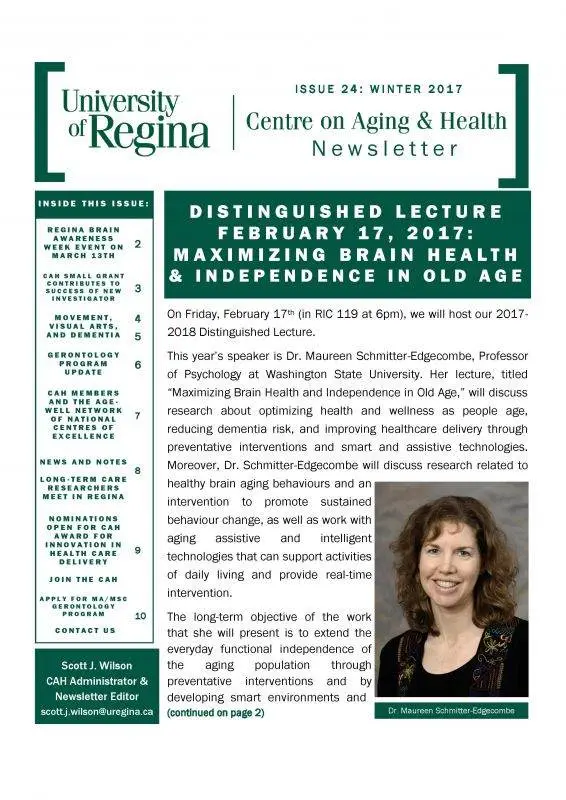
The latest issue of the CAH Newsletter (Issue 24) is now available for download on our website (click here)
This issue contains stories on our upcoming Distinguished Lecture (February 17, 2017 at 6pm in RIC 119), our upcoming Brain Awareness Week Event on March 13th, as well as an article about movement, visual arts, and dementia, an update on the gerontology program, CAH member work with AGE-WELL, a new investigator’s success after receiving a CAH grant, and much more.
The CAH Newsletter features stories and updates on member research and awards, CAH events, graduate education, and a variety of other topics related to aging and health research.
Should you have story ideas or wish to inquire about advertising opportunities, please contact scott.j.wilson@uregina.ca or 306.337.8477.
We just published a state of the art systematic review of pain assessment tools for people living with severe dementia. We provided recommendations for the most supported tools @AIGMcLennan @UofRegina https://www.sciencedirect.com/science/article/pii/S0272735826000139?via%3Dihub
The Winter 2026 CAH Newsletter has stories about:
Research on menopause with Canada Research Chair Dr. Jennifer Gordon, upcoming CAH spring public events, CAH relaunching research participant pool, CAH Director inducted as Fellow of the RSC, and more!
https://research.uregina.ca/cah/newsletters/issue-41/
Congratulations to #URegina's @DrThomasHadjist, newly elected as a Fellow of the @src_rsc. His groundbreaking work is improving care for older adults with #dementia and chronic pain worldwide.
📺 Watch the video below, and learn more in Discourse: 📖 https://bit.ly/3WWYQbC
Two #URegina researchers have been elected Fellows of the @src_rsc — the country’s highest academic honour. 👏
Congrats to Dr. @rncarleton and @DrThomasHadjist, whose research is improving lives across Canada and beyond.
Learn more in Discourse:

Two U of R academics honoured | Discourse Magazine
Two University of Regina researchers elected Fellows of the Royal Society of Canada
bit.ly
📅 Mark your calendars! Join us on Dec 10 for a webinar that explores how building design & operation can protect older adults’ health against extreme heat and wildfire smoke events.
🔗 Don’t miss out—register today: https://shorturl.at/IQwQg
Deeply honoured to join the Royal Society of Canada. I am grateful to an extraordinary team of collaborators and trainees who have helped advance our research on pain in dementia. Proud of what we’ve built, and motivated for what’s next.